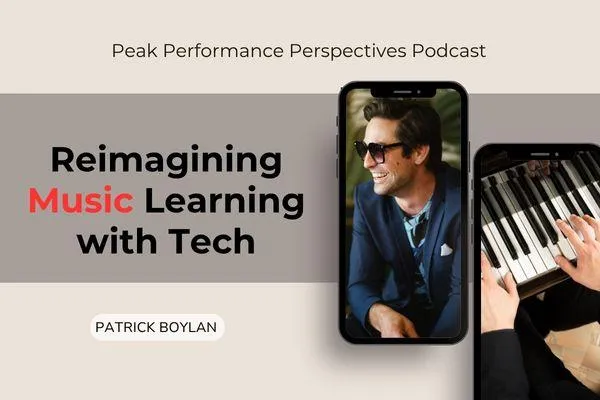
Revolutionizing Music Education Through Museflow with Patrick Boylan
In conversation with Patrick Boylan: Transforming Music Learning Through Museflow’s Blend of Flow, Creativity, and Technology
Patrick Boylan reflects on how traditional piano lessons left him uninspired, motivating the creation of Museflow. This app aims at transforming music learning by focusing on personalization, flow state, and joyful engagement rather than repetitive practice.
Museflow’s core philosophy centers on flow—the mental state where learning feels effortless. By dynamically adjusting challenge and skill levels, the app helps users progress without feeling overwhelmed, boosting both confidence and enjoyment.
Unlike static drills, Museflow allows learners to modify tempo and phrasing. Patrick believes that transforming music learning means making space for creativity and self-expression in technical practice.
Rather than replacing music teachers, Museflow is designed to complement them. It automates the mechanical aspects of learning so instructors can focus on artistry, interpretation, and emotional expression.
Patrick envisions a future where Museflow integrates emerging tech like AI and AR. Tools such as wrist sensors and posture correction will make learning even more immersive and physically intuitive.
The episode is a call for musicians, educators, and learners to reimagine music education—not as a rigid routine, but as a flowing, adaptive, and deeply personal journey.
Key Takeaways
1. Transforming Music Learning
Museflow redefines how we approach music education by blending fun with skill-building.
Patrick explains that music learning doesn’t have to be rigid. Instead, gamified, adaptive lessons help students stay engaged while building essential technical skills in varied contexts.
Moves beyond rote learning to interactive experiences.
Uses adaptive tech to adjust challenges in real time.
Encourages long-term learning by raising skill thresholds.
Students learn with joy, not pressure.
Transforming music learning requires innovation with purpose.
2. Achieving Flow State
Learning becomes powerful when it feels effortless.
Patrick designed Museflow to help learners achieve flow—where focus and satisfaction merge. Dynamic challenges prevent boredom or burnout, maintaining momentum and creativity.
Lessons adapt to user pace and accuracy.
Flow makes practice sustainable and fun.
Progress feels natural rather than forced.
Flow keeps users emotionally invested.
Transforming music learning means cultivating engagement.
3. Complementing Teachers
Technology and tradition can work together.
Patrick emphasizes that Museflow enhances teaching, not replaces it. While the app automates technical drills, human instructors bring emotional depth and interpretive guidance.
Frees teachers from repetitive skill exercises.
Allows more time for artistry and nuance.
Builds synergy between tech and teacher.
Improves lesson efficiency and outcomes.
Transforming music learning honors both innovation and legacy.
4. Creative Improvisation
Museflow turns drills into discovery.
Instead of rigid repetition, Museflow encourages students to experiment with tempo, phrasing, and expression—turning each session into a chance to create and explore.
Encourages active musical interpretation.
Builds confidence through experimentation.
Teaches that creativity is a core skill, not a luxury.
Students connect emotionally with the music.
Transforming music learning requires space for play.
5. Future of Music Education
Tech will enhance—not replace—the heart of music.
Patrick discusses plans for AI and AR integrations, including posture sensors, haptic feedback, and virtual lessons. These innovations will deepen technical precision while preserving the emotional heart of musicianship.
AI can guide body alignment and hand technique.
AR may offer visual overlays for better posture.
Future tools will support accessibility and personalization.
Emotion and human expression remain at the center.
Transforming music learning evolves with mindful tech.
WATCH ON YOUTUBE:
Episode Resources
INSTAGRAM:https://www.instagram.com/museflow.ai/#
Listen and Subscribe to the Podcast here:
SPOTIFY:https://open.spotify.com/episode/0MzQsgIMldsOiZR6Whha4t?si=xcQF5zIaSO2V9acU8Q6USA
APPLE MUSIC:https://tinyurl.com/yrnccbt2
AMAZON MUSIC:https://tinyurl.com/3upyyzvm
ABOUT PATRICK BOYLAN:
Patrick Boylan is a skilled multi-instrumentalist with a deep passion for self-education. Despite eight years of traditional piano lessons, Patrick found the repetitive nature of practicing the same pieces uninspiring. Like many music students, he struggled with the conventional approach. However, when his teacher retired, Patrick began exploring his parents' sheet music on his own, selecting phrases he enjoyed and improvising around them. This self-directed experimentation not only reignited his interest in music but also led him to uncover the foundational elements of musical theater. Today, Patrick can sight-read virtually any musical theater composition. His experience with traditional music education, combined with his innovative spirit, inspired him to co-found MuseFlow, a cutting-edge music edtech startup often referred to as "The Duolingo of Music Education."